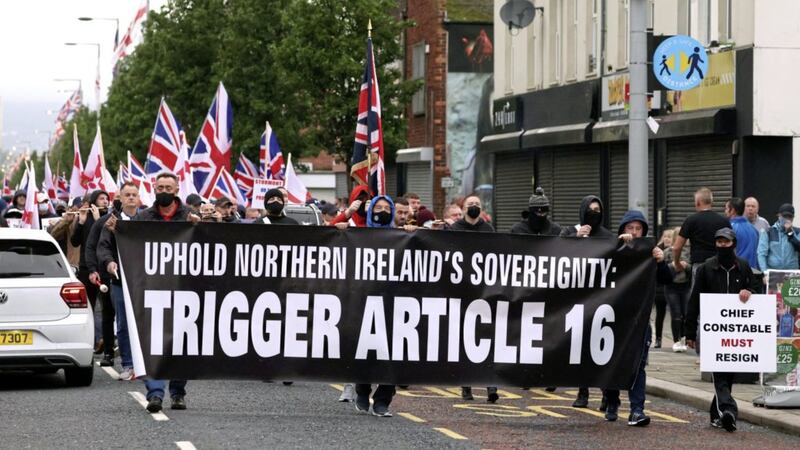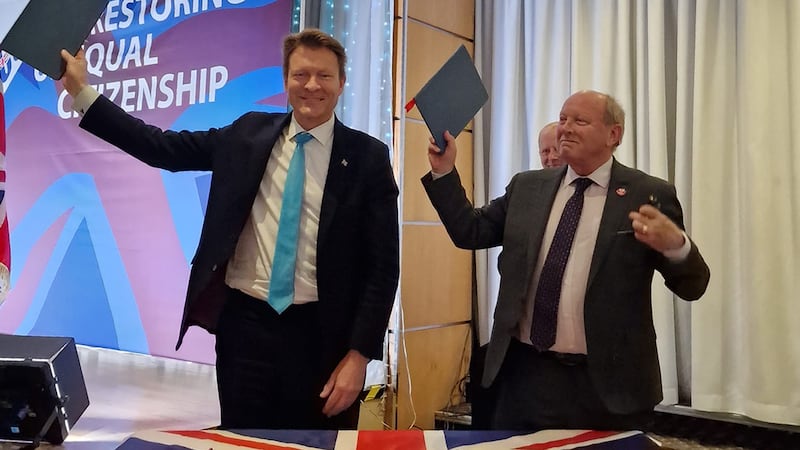On Monday of this week, the High Court in Belfast ruled that the DUP boycott of north-south ministerial meetings in protest against the Brexit protocol was unlawful.
Mr Justice Scoffield said that the actions of DUP ministers :“…frustrates, is contrary to and is in breach of legal duties contained in the Northern Ireland Act.”
He stated that the pledge of office set out in the executive’s ministerial code effectively included a commitment to participate in the North-South Ministerial Council and the British Irish Council and concluded: “It is difficult for the court to reach any other conclusion than that the respondents have consciously determined to act in contravention of the pledge of office and the ministerial code.”
The court stopped short of compelling the DUP ministers named in the judicial review proceedings to attend meetings, stating that it hoped common sense will prevail.
The DUP’s response to the outcome of the proceedings (which they did not defend) was to say that Article 16 of the protocol should be invoked, but this shows a wilful misrepresentation of what Article 16 actually means.
Article 16 does not allow for the suspension of the protocol permanently or in its entirety. Any measures taken under Article 16 can only be taken after a one month negotiation period between the EU and British government, and only then if a solution has not been found. These measures are then subject to review every three months.
Political unionism continues to wave Article 16 of the protocol around like it’s a get out of jail free card, excusing all bad behaviour, but we are not in a game of monopoly.
Prior to the publication of the EU’s proposals on aspects of the protocol yesterday, Jeffrey Donaldson stated that the unity of unionism against the protocol had “breached the first wall” by bringing the EU back to the negotiating table. That might be the case. It could also be the case that the EU is trying to come up with workable solutions in the face of the British government having done absolutely nothing in terms of putting in place the infrastructure required to manage trade when grace periods come to an end.
The DUP said it was withdrawing from Strand 2 north-south meetings because the Strand 3 east-west relationships of the Good Friday Agreement had collapsed as a result of the protocol. This argument was premised on conflating the Irish government with the EU, and in any case, wasn’t a factor in the court’s decision. The ministerial code is stand-alone.
If you take at face value unionism’s argument that the protocol undermines the position of the north in the United Kingdom, then you must question what it is willing to do in order to address that.
The British opposition to the European Court of Justice which, as things stand, would be the institution for ensuring compliance with the rules of the protocol is quite baffling. The ECJ deals with matters of EU law and can only deal with that which is referred to it by national courts. It is not a court of appeal.
The overstating of the ECJ’s role is simply a distraction, a bargaining tool. As Stephen Kelly, Chief Executive of Manufacturing NI has said: “In all the months since the whole operational plan of the protocol was agreed and throughout this year, no one in business has raised the issue of the ECJ oversight as a problem for them in my presence. It is purely a political and sovereignty issue, and not a practical or business issue.”
Let’s imagine for a moment that Article 16 is invoked by the British government to prevent any checks on goods going between the north and Britain. The EU will protect its single market. The impact would therefore be to create a hard border on the island and to negatively impact on trade across this island and between the north and the EU.
The harsh outworking of that would be the empty supermarket shelves and queues at petrol stations we’re witnessing in England right now, and queues into Dundalk, Letterkenny and Monaghan shopping centres.
Far from strengthening the union, the removal of the protocol would much more likely serve to amplify calls for a united Ireland, not only from the republican and nationalist communities, but from the political centre ground who have always identified as European. The impact on their lifestyle will have an impact at the ballot box when people realise, finally, that you cannot eat a flag.
The old story of the radio transmission between the battleship and the lighthouse comes to mind. The lighthouse is built on the rock of protecting the EU single market and it cannot alter its course so the British battleship is going to have to move a few degrees. The problem is that too many in unionism see changing course as a defeat, when in fact it would be an act of self-preservation.








